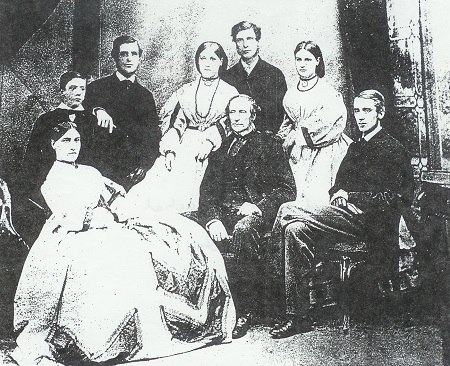|
The family lived at Ballyowen from the 1830s to sometime in the 1860s.

The photo was taken in 1860 and shows (Standing) – George, Sandy, Katie, Fred and Rachel, and (Seated) – Fanny, Richard the father, and John.
All of the children were born in Lucan in the 1830s and 40s. John who was born in 1939 became a Minister of the Church of England, and along with his brother Frederick, had a private school at Riwoka, New Zealand, where he died in 1920.
Towards the end of the 1800s, John wrote a letter to his younger brother George, questioning and giving an account of his memories.
The following is an extract from the letter:
“Sandy was born at Ballyowen in 41-2 ….. where do you come in? I want to know badly, because that was about the time my father foolishly sold Ballyowen, and made an ass of himself when he went to College Green. I know we were there in 1848, as I recollect a dispute between some men and a soldier outside Beggar’s Bus Barracks, an Infantry Barracks. The soldier’s disputant was evidently a rebel, as he spoke hopefully of a rising in ’49 – “Wait till the first of March ’49, and then we’ll take this ‘ere barracks and slaughter all the English boys therein”. I am quoting from memory, and giving the sense if not the words.
We are not really Irish, the whole blessed lot of us come, on our Father’s side from Yorkshire… and on our Mother’s side from Hampshire. Our Step-Grandfather Mr. Meller, our Grandmother’s first husband, if I am correctly informed, was sent over to Ireland by the British Government in some official legal position – I think, as Solicitor General to the Government of that day – at all events his official position created some sore feeling on the part of the Irish Patriots, and upon one occasion his carriage, containing his wife and other members of his family, was proceeding along the Four courts, when it was stopped by a mob of yelling Irish. “ ---- ------ with the Sassenach” – was the mildest epithet they hurled against the devoted party, and they promptly proceeded to give our grandsiress a taste of what she might expect hereafter by lighting a tar burne, into which by violent hands, they endeavoured to thrust her and her daughter; fortunately, before their kind endeavours could be carried into effect, the soldiers put in a appearance, and then ‘the music began’.
They poured volley after volley in the thick of the mob and inflicted such an awful slaughter, that the scene of the outrage was known ever after as ‘The Bloody Bridge’, and bears that name to this day. It is the bridge nearer the Phoenix Park than Essex Street Bridge the next or the next but one. After this experience of Ireland, our Grandmother was always urging her husband to return to England and civilization, and indeed, her experience of Ireland in those troublous times was not of a nature to make her all in love with the country.
Let me mention one incident in support. Our Grandparents were giving a dinner party, and during the course of the evening when the ladies assembled in the drawing room for music one of them played ‘Croppie, lie down’, a song as obnoxious to the Irish rebels as ‘Boyne Water’. It had reference to the rebels, who were caught and imprisoned, had their hair cropped, and a song mocked them to ‘lie down and have a bating’. However, Paddie did not appreciate such kind intention, and one of my Grandfather’s footmen took a large knife off the dining room table, and walking into the drawing room he plunged it into the poor girl’s heart. This was in the troublous days of ’98. Of course, it goes without saying, he swung for it, but that was but a poor satisfaction for the poor girl’s life.”
Ref. Treasures of Lucan by Mary Mulhall and Joan O’Flynn 2007
|